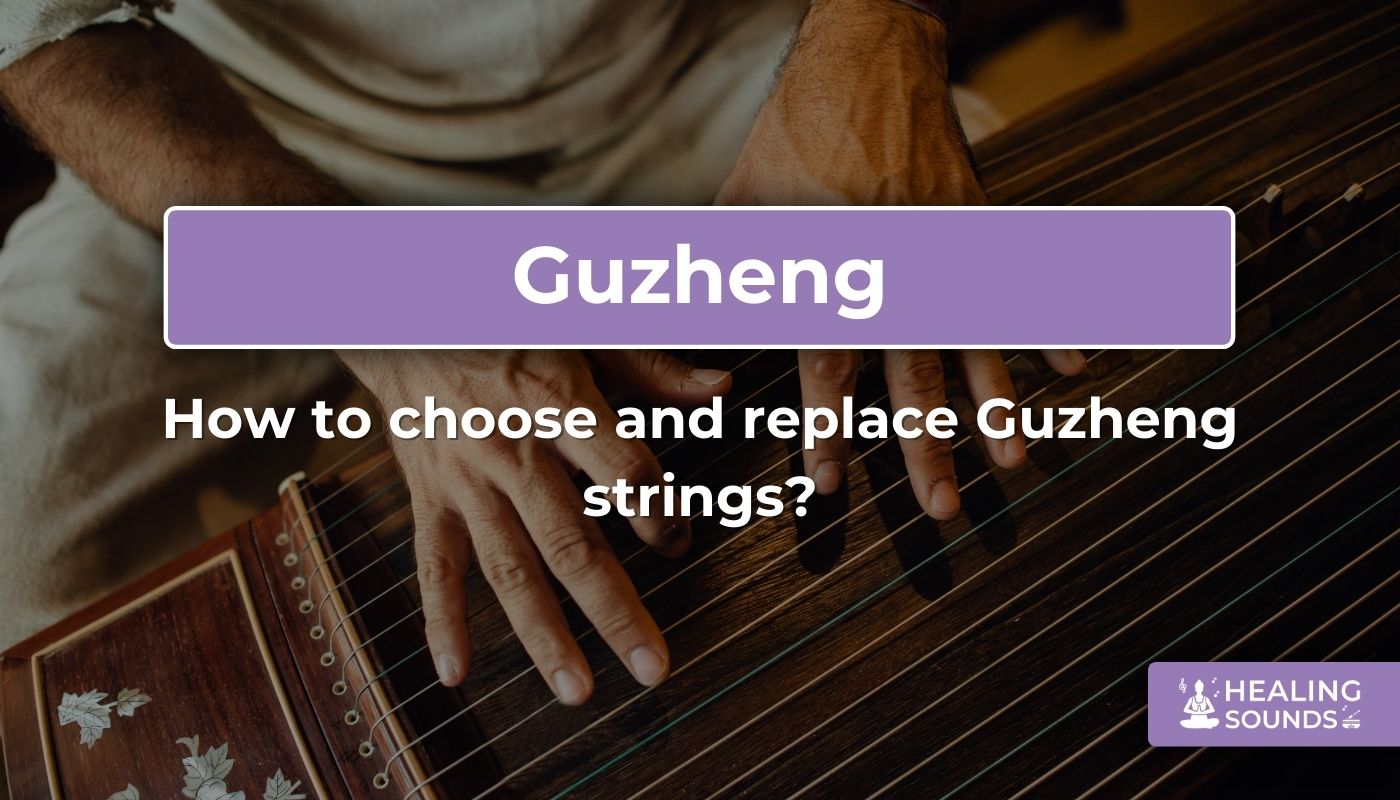The guzheng, a captivating Chinese zither with a rich history spanning over 2,500 years, continues to enchant listeners with its ethereal melodies. Known as 古筝 in Chinese, this instrument's emotional depth relies heavily on its strings. If you're navigating the world of guzheng playing, understanding how to choose guzheng strings and when to replace guzheng strings is crucial. This guide will walk you through everything you need to know about finding the best guzheng strings for your instrument, whether you're just starting or looking to refine your sound.
Why Guzheng Strings Are Crucial for Your Sound
Every performer, from beginner to advanced, knows that the strings are the heart of the guzheng's voice. The quality and type of guzheng strings directly shape the instrument's tonal character and playability. They are fundamental to achieving the expressive sound this beautiful zither is famous for.
Here's why paying attention to your strings is so important:
- Tone Quality: Strings are the primary factor determining the timbre, or unique sound color, of your guzheng. Some strings produce bright, clear notes, while others offer mellow, warm, and resonant tones.
- Durability: High-quality strings are designed to withstand the significant tension required for guzheng playing. They last longer and are less prone to breaking unexpectedly.
- Playability: The feel and responsiveness of the strings impacts your playing experience. Strings with the right tension and material feel comfortable under the fingers, allowing for smoother plucking and techniques.
Ultimately, selecting the right strings is the first step towards unlocking the best possible sound from your instrument.
Types of Guzheng Strings and Their Distinct Characteristics
Guzheng strings have evolved over time. While traditional instruments used silk, modern guzheng primarily feature metal or metal strings wrapped in nylon. Understanding the differences helps in selecting guzheng strings that match your needs.
Let's explore the common types:
- Silk Strings: Historically significant, silk strings produce a uniquely warm, gentle, and mellow sound, often preferred for very traditional Chinese music. However, they are fragile, expensive, require frequent tuning, and are generally not recommended for beginners.
- Steel Strings: These offer a bright, loud, and piercing tone with a strong metallic resonance. They are durable but can sometimes sound harsh compared to other types.
- Nylon-Wrapped Steel Strings: This is the most common type today, offering a good balance. A steel core provides strength and brightness, while the nylon wrapping mellows the tone, adding warmth and reducing harshness. They offer good durability and playability, making them suitable for various styles and skill levels. These are often considered the best guzheng strings for versatility.
Your choice will depend heavily on the sound profile you desire and your playing style.
How to Choose the Best Guzheng Strings for Your Instrument
Choosing the right set from the various nylon, silk, steel guzheng strings available can feel complex. Here’s how to narrow down your options when you need to choose guzheng strings:
Match Strings to Your Skill Level
For beginners, ease of play and durability are key. Nylon-wrapped steel strings are generally the most recommended. They are more forgiving than delicate silk strings and offer a balanced tone that's pleasant for learning. They hold their tune relatively well once settled.
Consider Your Musical Style
What kind of music do you intend to play? For highly traditional pieces aiming for authentic historical sound, dedicated players might explore silk (though impractical for most). For contemporary music or pieces requiring projection and brightness, steel or brighter nylon-wrapped steel might be preferred. Most players find standard nylon-wrapped strings versatile enough for a wide repertoire.
String Gauge (Thickness) Matters
Guzheng strings come in varying thicknesses (gauges). Thicker strings produce lower, more resonant bass notes, while thinner strings create the higher-pitched, crisp sounds. Most guzheng use a standard set configuration, but ensure the set matches the 21-string standard unless you have a specialized instrument.

70 cm Portable Guzheng 21 Strings Chinese Zither
$529.90 $689.90
This compact Guzheng is perfect for beginners focusing on learning technique and string basics, offering portability without compromising the essential 21-string setup.
Explore This GuzhengStep-by-Step Guide: Replacing Guzheng Strings
Performing a guzheng string replacement is a necessary skill. While it might seem intimidating initially, following these steps makes the process manageable:
- Gather Your Tools: You'll need your new set of guzheng strings, wire cutters, and potentially guzheng tuning wrench (often included with the instrument). Some players use pliers carefully, but a dedicated tuning wrench is safer.
- Remove Old Strings Carefully: Loosen the tension on an old string significantly using the tuning peg before cutting it near the peg and carefully pulling it out from the bridge and anchor point. Replace strings one by one to maintain overall tension balance on the instrument.
- Install New Strings: Secure the looped end of the new string onto the anchor pin (underneath or at the tailpiece). Thread the other end through the appropriate hole in the tuning peg box, over the fixed bridge, and across the movable bridge. Pull the string taut, leaving enough slack to wind around the tuning peg several times.
- Wind and Tune: Insert the string end into the tuning peg hole. Begin winding the string onto the peg, ensuring it winds neatly. Bring the string up to approximate pitch using a tuner. Repeat for all strings needing replacement.
- Stretch and Retune: New strings will stretch and go out of tune frequently at first. Gently press or pull the string slightly to help it settle. Tune your guzheng regularly over the next few days until the strings stabilize. Patience is key!
Remember: Always tune carefully and avoid overtightening, which can snap the string or damage the instrument.
The Benefits of Using Quality Strings
Investing in quality guzheng strings offers tangible advantages:
- Superior Sound: Better materials and manufacturing processes result in strings that produce richer, clearer, and more resonant tones.
- Increased Longevity: Quality strings are more durable and less likely to break or lose their tonal quality quickly, saving you frequent replacements.
- Enhanced Playing Experience: Well-made strings feel smoother and more responsive under the fingers, making playing more enjoyable and techniques easier to execute.
- Tuning Stability: Higher quality strings tend to hold their pitch better once properly stretched and settled.
While quality strings might have a higher upfront cost, their longevity and superior performance make them a worthwhile investment for any serious player.
Discover Our Range of Guzheng Instruments

100 cm Guzheng Zither 21 Strings Paulownia
$609.90
$789.90
Crafted from resonant Paulownia wood, the quality of this Guzheng ensures your chosen strings will sound their best. Learn more ➔

130 cm Guzheng Solid Wood 21 Strings Portable
$799.90
$1039.90
A professional-grade solid wood Guzheng designed for optimal resonance, showcasing the nuances of high-quality strings. Learn more ➔

32 inch Mini Guzheng 21-String Paulownia Chinese Zither
$399.90
$519.90
This beginner-friendly mini Guzheng is lightweight and manageable, perfect for learning string care and basic playing. Learn more ➔
Maintaining Your Guzheng Strings for Longevity
Proper care significantly extends the life of your guzheng strings and maintains their sonic quality. Incorporate these simple habits:
- Clean After Playing: Use a soft, dry microfiber cloth to gently wipe down the strings after each practice session. This removes sweat, oils, and dust that can cause corrosion.
- Avoid Over-Tightening: Tune accurately using an electronic tuner. Excess tension not only risks breaking the string but can also damage the instrument's bridges and soundboard.
- Store Properly: Keep your guzheng in a case when not in use, ideally in an environment with stable humidity and temperature. Extreme changes can affect string tension and longevity.
- Check Bridges: Ensure the movable bridges are positioned correctly. Misaligned bridges can cause uneven tension and affect intonation. Find more information about essential guzheng accessories like bridges and tuners here.
Consistent maintenance is key to keeping your strings sounding great and lasting longer.
Conclusion
Choosing, replacing, and maintaining the best guzheng strings for your needs is fundamental to your musical journey with this enchanting instrument. By understanding the different types of strings (nylon, silk, steel guzheng strings), knowing how to choose guzheng strings based on your level and style, and learning the proper steps for guzheng string replacement and care, you empower yourself to achieve the best possible sound and playing experience.
At Healing Sounds, we are passionate about traditional instruments like the guzheng. Explore our collection of high-quality guzheng and discover resources to support your musical practice. While we currently focus on providing exceptional instruments, understanding strings is part of appreciating the whole system. For more insights into the world of Chinese music, consider exploring resources like the Encyclopedia Britannica's entry on the Zheng.
Frequently Asked Questions about Guzheng Strings
The "best" strings depend on personal preference and needs. However, nylon-wrapped steel strings are the most popular choice for their balance of durability, playability, and versatile tone, making them suitable for beginners and intermediate players across various musical styles.
Frequency depends on playing habits and string type. As a general guideline, casual players might replace strings every 6 months to a year. More frequent players or those noticing dull sound, rust, or tuning instability should replace them sooner. Always replace a string immediately if it breaks.
There isn't one single "best" brand, as player preferences vary. Reputable brands often specialize in different levels (beginner, intermediate, professional) and sound characteristics. Healing Sounds offers curated Guzhengs known for quality craftsmanship suitable for various levels, like our Paulownia wood models.
Generally, the guzheng is considered easier for beginners to start producing pleasant sounds quickly due to its marked bridges and brighter tone. The guqin, with its fretless design and subtle techniques, often requires more initial patience and precision to master intonation and expression.
Consider your skill level (beginners often prefer durable, easy-to-play nylon-wrapped steel), your desired musical style (traditional vs. modern), and the specific type of guzheng you own. Listen to sound samples if possible and start with standard recommendations if unsure.

